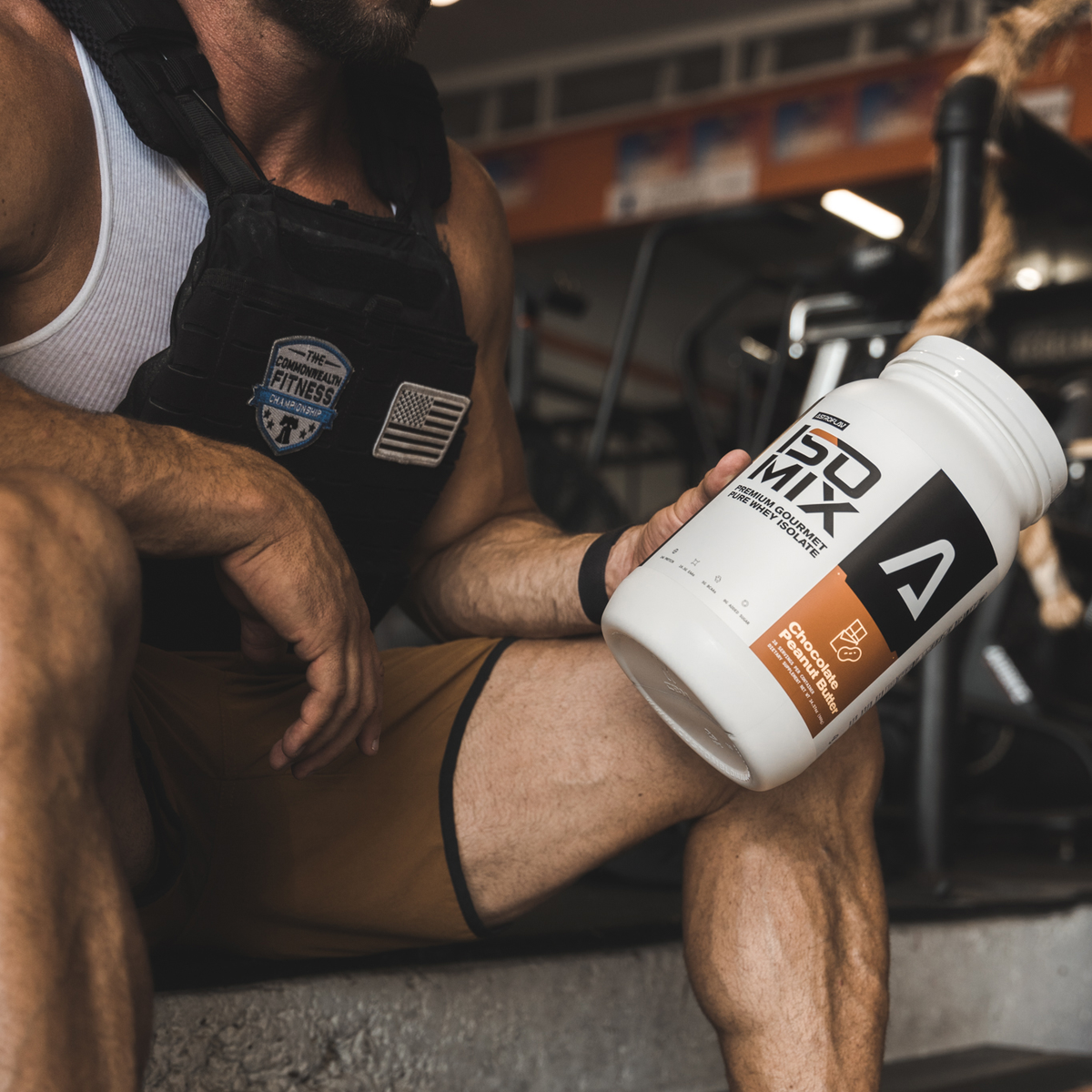
Glutamine | Build Muscle & Recover Faster
In the ongoing journey of getting fit and healthy you've likely come across a multitude of supplements to help grow your muscles and improve recovery. Now, before you go out and spend an arm and a leg for products you're unsure of exactly what they do, let's talk about Glutamine .
Glutamine supplements not only help boost muscle growth, but also contribute to improved post-exercise recovery. This article will go over everything you need to know about this rising supplement and all other various health benefits it provides! Keep scrolling to learn more!
What is Glutamine?
Glutamine is the most abundant amino acid found throughout the body. It is considered a non-essential amino acid as our body naturally produces glutamine in the muscles.
Our body naturally produces all the glutamine it needs on its own; however, under some conditions, you may need additional support. This is where we can obtain glutamine through the foods we eat or from a supplement form.
You can think of glutamine as a helper that supports your muscles, aiding in their growth and repair after intense physical activity. It plays a crucial role in promoting a healthy immune system, maintaining the integrity of the digestive tract, and serving as an energy source for certain cells.
Whether you're an athlete aiming for muscle gains or someone looking to support overall well-being, Glutamine is a versatile supplement with a range of benefits for your body.

How does Glutamine Work in the Body?
As previously mentioned, glutamine is a non-essential amino acid made from glutamate and ammonia. It is mainly produced in the muscle tissue (90%) and can also be found in small amounts in the brain and lungs [ 1 ] . It is also essential for helping make the neurotransmitters glutamic acid and gamma amino-butyric acid (GABA) which play a role in brain health and development [ 2 ].
One of its primary roles is promoting protein synthesis , a key factor in muscle development and repair. During intense physical activities or periods of stress, the body's glutamine levels may deplete, leading to muscle fatigue and reduced immune function. Supplementing with glutamine helps replenish these levels, supporting muscle recovery and enhancing overall immune response.
Additionally, glutamine plays a vital role in maintaining the integrity of the digestive tract lining, contributing to gut health. It serves as a readily available energy source for rapidly dividing cells, particularly those in the immune system and digestive system. Glutamine's multifaceted functions make it a valuable asset for optimizing muscle growth, muscle recover, immune function, and overall well-being.
Glutamine for Building Muscle
Glutamine operates as a multitasking hero within the body, contributing to several essential functions. Many athletes turn to glutamine supplements to improve their performance and minimize risk of injuries as it is a key player in protein synthesis – the biological process crucial for building and repairing muscle tissues.
During intense workouts, the body's glutamine levels can decline, hindering the muscle recovery process. Supplementing with glutamine provides the necessary building blocks for protein synthesis, promoting efficient muscle repair and growth. Additionally, glutamine helps to create a positive nitrogen balance in the body. It helps carry nitrogen around the blood and delivers it to the muscle tissues, making it a positive state to build muscle.
By facilitating these processes, glutamine becomes an essential component in enhanced muscle development, making it a valuable supplement for individuals striving to maximize their gains and sculpt a stronger physique.
Glutamine for Muscle Recovery
During intense workouts, the body's glutamine levels can decrease, leading to fatigue and muscle breakdown. Supplementing with glutamine helps replenish these levels, reducing muscle soreness and enhancing recovery. Glutamine steps in as a critical component for protein synthesis, facilitating the reconstruction of damaged muscle fibers. Its ability to replenish depleted glutamine levels in the body post-exercise aids in reducing muscle soreness and accelerates the overall recovery timeline.
By supporting the intricate balance of nitrogen in muscles, glutamine ensures a conducive environment for muscle protein synthesis, allowing athletes and bodybuilders to bounce back faster, minimize downtime, and maintain a consistent training regimen for achieving their desired physique goals.
Other Benefits of Glutamine
As we know, glutamine has many benefits pertaining to muscle growth and improving recovery; however, there are many additional benefits that supplementing with glutamine has for the body. Below is a list of additional benefits and positive impacts that glutamine has:
-
Immune System Support: Glutamine plays a crucial role in maintaining a robust immune system, protecting athletes from infections and illnesses.
-
Gut Health: It contributes to the integrity of the digestive tract lining, promoting a healthy gut environment.
-
Energy Source: Glutamine serves as a quick energy source for cells, particularly beneficial for high-demand tissues during strenuous physical activities.
-
Reduced Fatigue: By replenishing glutamine levels, athletes may experience decreased fatigue and improved endurance during training sessions.
-
Hydration Balance: Glutamine helps regulate water balance in cells, aiding in optimal hydration for enhanced performance.
-
Versatile Usage: Its adaptability makes glutamine suitable for various sports and fitness goals, supporting overall well-being and athletic performance.
Glutamine vs. BCAAs
So if glutamine is an amino acid, what is the difference between glutamine and BCAA's? While both glutamine and BCAAs (Branched-Chain Amino Acids) are essential components in the realm of sports nutrition, they serve distinct roles in the body.
Glutamine is a versatile amino acid crucial for overall muscle health, immune function, and digestive well-being. It plays a key role in protein synthesis and serves as an energy source for cells.
On the other hand, BCAAs, including leucine, isoleucine, and valine, are specific amino acids known for their direct involvement in muscle protein synthesis. Unlike glutamine, BCAAs are not produced by the body and must be obtained through diet or supplementation. While glutamine contributes to overall bodily functions, BCAAs are particularly focused on supporting muscle growth and recovery.
Both of these supplements have their unique benefits, and combining them can offer a comprehensive approach to muscle health and athletic performance.
Foods Containing Glutamine
Glutamine can naturally be found in a variety of foods. More specifically, the largest amounts of glutamine are found in animal products due to their high protein contents.
Additional glutamine can be found in plant-based sources, but not as much of a percentage compared to animal protein sources.
The following are percentages of glutamine found in each food source [3].
Eggs: 4.4% (0.6 g per 100 g of eggs)
Beef: 4.8% (1.2 g per 100 g of beef)
Chicken: (1.68 g per 100 g of chicken)
Skim milk: 8.1% (0.3 g per 100 g of milk)
Tofu: 9.1% (0.6 g per 100 g of tofu)
White rice: 11.1% (0.3 g per 100 g of rice)
Other plant-based sources contain glutamine such as corn, cabbage, spinach, and barley. Although these do not have quite as much as animal proteins, they are useful sources of glutamine for those who are plant-based or vegan.
Glutamine Supplements
Glutamine supplements are available in two common forms: powder and capsules, providing users with flexibility in choosing their preferred method of consumption.
Glutamine powder can be easily mixed into liquids like water or shakes, offering a quick and customizable way to incorporate the supplement into daily routines.
Our Glutamine Pure Grade Amino Acid powder contains 5 grams per serving and can be mixed with any of your favorite drinks or simply just water!
HOW TO USE:
As a dietary supplement, mix one serving of 5 grams (one scoop) into at least 16 ounces (500 ml) of water or suitable beverage and drink within 15 minutes. Consume one serving per day. For best results, use this product as part of a proper diet and exercise program.
The Bottom Line:
Glutamine emerges as an extremely beneficial supplement in the health and fitness industry. Offering benefits beyond just building muscle and promoting recovery, this versatile amino acid, naturally produced in the body, acts as a vital component for protein synthesis, aiding in muscle growth and repair after intense workouts.
While glutamine plays a crucial role in muscle recovery, it also contributes to immune system support, gut health, and acts as an energy source for cells. The supplement's positive impact extends to reducing fatigue, maintaining hydration balance, and supporting overall well-being.
Glutamine comes in both capsule and powder form. AstroFlav's Glutamine Pure Grade Amino Acid , our latest supplement release, makes it efficient to mix into your preferred drink to get the essential glutamine your body may need! CLICK HERE , to order yours today!
GLUTAMINE | PURE GRADE AMINO ACID
L-Glutamine is vegetable based, naturally fermented 100% L-Glutamine manufactured right here in the United States.
-
Enhance Recovery
-
Improve Gut Health
-
Immune System Support
-
500g size
-
5G Servings (100 Servings a bottle)
Manufactured in the USA
Our products are made in cGMP compliant facilities in the United States, using only the best ingredients. For us, it's all about quality control - so you can have confidence in your dietary supplements.
GLUTAMINE | PURE GRADE AMINO ACID
L-Glutamine is vegetable based, naturally fermented 100% L-Glutamine manufactured right here in the United States.
-
Enhance Recovery
-
Improve Gut Health
-
Immune System Support
-
500g size
-
5G Servings (100 Servings a bottle)
Manufactured in the USA
Our products are made in cGMP compliant facilities in the United States, using only the best ingredients. For us, it's all about quality control - so you can have confidence in your dietary supplements.
RESOURCES
-
Albrecht, J., Sidoryk-Węgrzynowicz, M., Zielińska, M., & Aschner, M. (2010). Roles of glutamine in neurotransmission. Neuron glia biology, 6(4), 263–276. https://doi.org/10.1017/S1740925X11000093
-
https://www.healthline.com/nutrition/glutamine#TOC_TITLE_HDR_3





